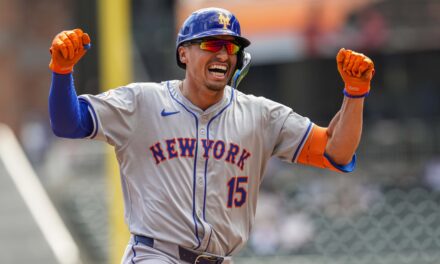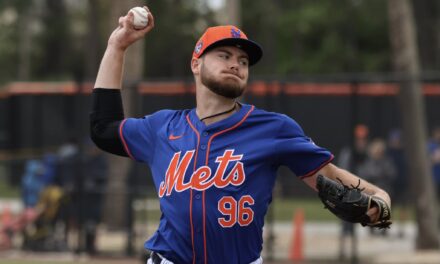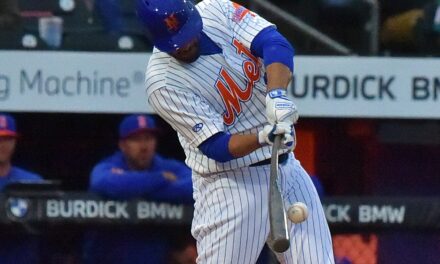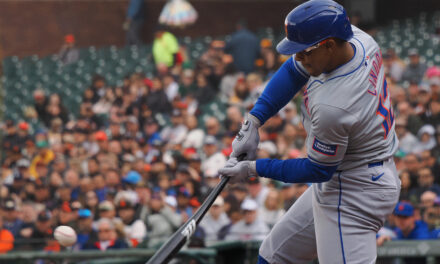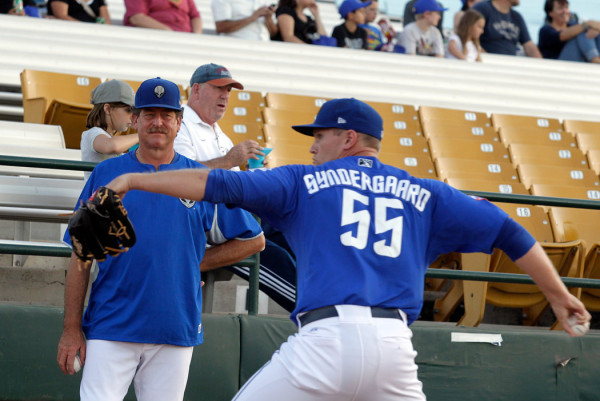
Photo Credit: John Gurzinski
For the last seven years, the New York Mets have had many of their young, talented arms under the tutelage of a former Cy Young Award winner and World Series MVP throughout their minor league system.
As many of the rising arms took shape, this two-time, twenty-game winner helped aid in critiquing, defining and preparing their physical and mental makeup for the major leagues.
Frank “Sweet Music” Viola has seen the accession and rise of such talented arms like Jacob deGrom, Steven Matz, Robert Gsellman, Seth Lugo and Noah Syndergaard.
Beginning his Mets coaching career in Brooklyn with the Cyclones in 2011, Viola made a quick rise through the system. He spent two seasons (2012-13) with the Single-A Savannah Sand Gnats before being named the Triple-A Las Vegas pitching coach in 2014, a position he’s held ever since.
Even with the formidable array of talent that worked with Viola, you won’t find the 57-year-old former lefty ace taking credit for their success. With Viola’s humble nature and calming influence, he’s quick to remind of all the terrific coaching that goes on throughout these prospects’ minor league paths, though, it’s hard to deny the impact his message and teachings have had on these young arms over the years.
Best known as a stalwart of the Minnesota Twins starting rotation, Viola spent eight-years with the club, including the 1987 championship season, helping to guide the club to its first World Series title in Minnesota (won in 1924 as the Washington Senators).
Viola made three starts in the ’87 World Series, including the deciding Game 7, where Viola went eight innings of two-run ball, on his way to earning World Series MVP.
Viola was dealt to the Mets prior to the 1989 deadline in a five-for-one package, with the team hoping to add the then 29-year-old to its staff after losing Dwight Gooden for most of the summer months due to to a partially torn muscle in his right shoulder.
Viola, the Long Island-native and Mets fan, was back at home in Queens, where he last pitched at the collegiate level for St. John’s University from 1979-81.
His time in New York might be considered bittersweet, filled with several personal accomplishments such as winning 20-games for the second time in his career in ’90 (18th player to record 20-win seasons in both leagues), finishing third in the N.L. Cy Young voting that year and being named on back-to-back All-Star teams from 1990-91.
Unfortunately, after back-to-back second-place finishes for the Mets in 1989-90, the team started to falter. They were 12 games above .500 at the break in ’91, however, finished a paltry 31-50 in the second half of the season, finishing fifth in the National League East and 20.5 games back of the first-place Pittsburgh Pirates.
Viola signed a free-agent deal with Boston in ’92, pitching parts of three seasons with the Red Sox before having Tommy John surgery in 1994. After making 15 starts from 1994-96, Viola retired, leaving with a lifetime record of 176-150 with a 3.73 ERA over 2,800-plus innings of work.
I had the privilege of speaking with Viola early last week where we spoke on his successful playing career, time with the Mets in the early nineties and his past seven years as pitching coach in the Mets organization.
MMO: Who were some of your favorite players growing up?
Frank: Growing up on Long Island, it’s funny, my dad was a New York Giants fan. When the Giants moved out to San Francisco the Mets came into existence so we became Met fans. His favorites were Mel Ott and Willie Mays.
When the Giants went to San Francisco and the Mets came in, he had to find someone with the Mets, so Tom Seaver came along. When I grew up and started watching the game when I was six-years-old on up, it was Tom Seaver and the Mets.
I wasn’t really a pitcher, I liked hitting. So I guess my first favorite player with the Mets was Cleon Jones.
MMO: When did you start pitching?
Frank: I didn’t start pitching until my junior year in high school. I was a first baseman growing up. I loved playing, I didn’t like to sit at all. Pitching looked like fun but it just wasn’t something that I wanted to do.
Then junior year in high school one of our pitchers got hurt and my coach said, “You’re left-handed, you’re a good athlete, why don’t you get out there and try it?”
And the rest is history. He must’ve seen something in me.
MMO: I’d be remiss not to mention what’s considered the greatest college baseball game ever played between St. John’s and Yale back in 1981. You against Ron Darling. What are some of your memories from that day?
Frank: I’m 57-years-old now. I’ve been involved with baseball for forty-eight years and I can honestly say, still to this day, it was the best-pitched game I have ever witnessed. And it wasn’t me, it was Ronnie [Darling].
When you sit there and watch a baseball game you take it all in. People love high scoring games; some people like 1-0 pitchers’ duels. We just sat there as a team, as a collective group of thirty guys watching this guy put on just an amazing show.
The thing was we were intrigued, we were enthralled, but we also knew that we were playing. We kept our heads in the game. Every inning I walked off it seemed like we were losing, but you looked up at the scoreboard [and] it still said 0-0.
It was just amazing and I’ve seen some great individual games in the professional level. I was there when David Cone struck out 19 Phillies back in 1991. Just to see the total domination of a lineup that, in college baseball, was pretty special in our St. John’s lineup. To see what he did to us is just something that I was glad to be part of.
I’m glad that people won’t soon forget about it, and we’re talking thirty plus years now.
MMO: When and how did you earn your nickname “Sweet Music”?
Frank: Chris Berman. My first nickname when I broke into baseball, that’s when Chris was really big into the Bert “Be Home” Blyleven and all of those. My first nickname that he gave to me was “101 Strings” Viola, you know Viola, viola.
Two old ladies in the Minneapolis-Saint Paul area, I want to say Minneapolis, they called ESPN to talk to Chris. I guess I had pitched one of my rare, really good games and the headline in the Minneapolis Tribune the following day after the game was, “Viola Plays Sweet Music Again” against somebody. And the ladies said, “My God, ‘Sweet Music’ Viola, what a perfect nickname!”
They called Chris and said, “We’d like to see if you’d be interested to changing his nickname from ‘101 Strings’ to ‘Sweet Music’?” This is before cell phones mind you. Chris picked up the phone and called me via the Metrodome or wherever I was and goes, “What do you think?” I had the final say and we decided with “Sweet Music”, and that stuck with me ever since.
MMO: From 1984-93 you were tied with Roger Clemens for most wins (163), you had the most game starts (349), innings pitched (2424.2 IP), and were 5th in fWAR (41.7). Those are some dominating stats; what do you attribute your success in those years to most?
Frank: First and foremost, in the midst of that it was the changeup that I found, my newfound changeup. A lot of credit goes to Johnny Podres, who was my pitching coach. Johnny had a history with the Dodgers and so on and so forth, he actually helped Curt Schilling develop his changeup when he went to the Phillies.
Johnny had a lot to do with that, it really changed my career around and made me the perennial winner that I became for that short period of time. I guess the biggest thing was just I had a great bunch of teammates that made the plays defensively for me, they scored enough runs to make it happen for me.
My family had a lot to do with that. I was situated, I was settled, I was happy. I had a beautiful wife and three great kids and you put that all together and success is bound to happen if you work hard enough for it, and fortunately, I was able to do that. I loved doing it, going out to the baseball field every day and I think that’s why a lot of it played out like it did.
MMO: How would you describe your time with the Mets from 1989-91?
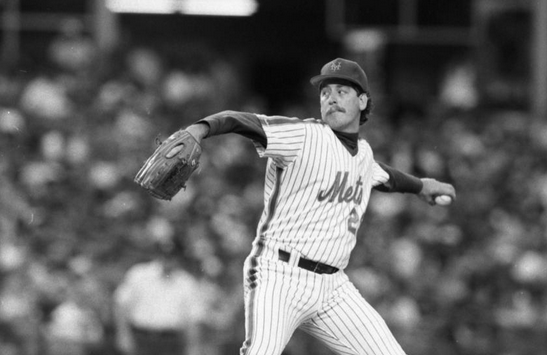
Frank: Fantastic to start and absolutely horrendous to end. And by that I mean it was great coming back to a team I rooted for as a kid, to be a part of that. I was fortunate as an individual to win 20 games with the Mets, which a lot of kids would just dream about and love to be able to do. The worst part about it was I ended up three and something in the second half of my last year with the club in ‘91. I was absolutely a horror show.
During the two and a half years-three years I was there we had more talent than anybody in baseball, but we couldn’t win a division. I guess from a personal standpoint it was rewarding early and very frustrating at the end.
It would’ve been nice to be able to continue pitching there but it was between Doc [Gooden] and myself, and they decided to stay with Doc after the ‘91 season. I also didn’t help myself by pitching as badly as I did at the end of that year because I didn’t have the numbers in front of me.
You talked about WAR and all this other stuff, you have to have numbers behind you, and I just didn’t finish as strong as I would’ve liked and they made the decision they needed to make.
MMO: You’ve now been with the Mets’ organization for seven years as a pitching coach, as you worked up the ladder to Triple-A Las Vegas. How would you describe your coaching style and pitching philosophy?
Frank: That’s a good question. I guess my coaching philosophy is the same as it was as a player: you want to see these guys get the most out of their ability.
I guess first and foremost you want to make sure the biggest reason that they’re there is to make it to the major leagues. I think the smartest move I ever made getting back into professional baseball as a coach was starting at the lowest level, the New York Penn League, working from Brooklyn on up. Seeing how these kids and what these kids have to go through on a daily basis to get to the big leagues.
A lot of us major leaguers who spent fifteen years in the big leagues take a lot of things for granted. You watch the way baseball has been the last five to ten years, these kids have really got to bust it to have the best opportunity to even to have a chance to break into the big leagues. From rookie ball, you have to go to so many different levels and classifications and travels. It is absolutely mind-boggling, and at pretty much no money! It’s mind-boggling to see what they have to go through on a daily basis, the grind they have to go through to succeed. I tip my hat to all of these kids because, as I said, if I didn’t have to go through it myself as a coach and see what they have to go through, I’d probably take a lot of things for granted.
Just as an example: Four years in the Pacific Coast League, you pitch in this Pacific Coast League and you survive in the Pacific Coast League, you’re going to be successful. Seth Lugo was an example. Last year he got brought up the big leagues in July of ‘16, and he had a six-plus ERA [with Triple-A]. The funny part was, a six-plus ERA in the Pacific Coast League with everything that it involves with the hitters’ ballparks, the altitude, the travel, to everything else is not as bad as people think if you’re there on an everyday basis. Because if you pound the strike zone, attack the strike zone and you do what you need to do at the Pacific Coast League level, you’re going to get hit, you’re going to give up runs.
You can’t change the style of pitcher, who you are as a pitcher, otherwise, it’s going to dictate to the big leagues as well. What Seth did in the Pacific Coast League with the six-plus ERA, anybody who watched him pitch there knew that he was going to be successful in New York because he wasn’t afraid to attack the strike zone. He wasn’t afraid to get ahead strike one, he wasn’t afraid to say, “Hey, it’s 3-2, I’m going to throw my best pitch at you right now, hit it as good as you can.”
You get people out at Citi Field where as in the Pacific Coast League those balls are hit out of the ballpark. You can’t change the style of pitching I guess my biggest comment would be, you can’t change the style of pitching from where you’re at. You have to know and pitch to your strengths and stick with that, that’s what’s going to make you successful when you get to the big leagues.
MMO: I was going to ask you about the Pacific Coast League and the impact it has on developing pitchers. So more or less, you teach your pitcher to keep with their strengths, knowing that even if it’s not successful at that level, not to be deterred because it could/should translate in the majors?
Frank: Absolutely. To follow up on your previous question, too, the biggest thing that I have going for me is that I’ve been at the highest of highs and the lowest of lows. From the high school days to, I mean, I walked away from baseball at the ninth grade. I said, ‘I can’t do this.’
I had just had my first slump; I had never been through something bad and I walked away. I walked home from school and my dad tried following me in the car and said, “Get in the car and talk about it.”
I said, ‘Alright.’
[I] cleared my head out and it took a little bit. But then you realize, Stop feeling sorry for yourself, you’re going to have good days and bad days, you’ve got to keep plugging away.
The biggest thing these kids have to understand is it’s a mental grind. Everybody’s physical tools are there, otherwise, they wouldn’t get to the levels they get to. What makes a great pitcher a great pitcher is that mental part of the game. You asked what my biggest strength is, that’s my biggest strength by far.
I could talk the game with these kids anytime, anywhere, and one thing that I have going for me is that I have that window of opportunity because of what I accomplished as a professional. These kids are going to go home and say, wait a minute, Frank’s won twenty games, Frank’s a Cy Young Award winner, maybe he does have something that will help me.
I have that few extra minutes that someone else might not have to be able to make my point. The bottom line is if I don’t make my point and make that point to how it’s going to help him, the individual pitcher, not me, then I lose him.
I guess the biggest thing that I have going for me, and, ultimately if I do get that opportunity as a big-league pitching coach, is I’ve been through everything. We could talk through anything if they’re able to work it out, and I think that’s the biggest strength that I have going for me and I think that’s what will ultimately help me as far as clicking with these kids from here on forward, as long as I’m coaching.
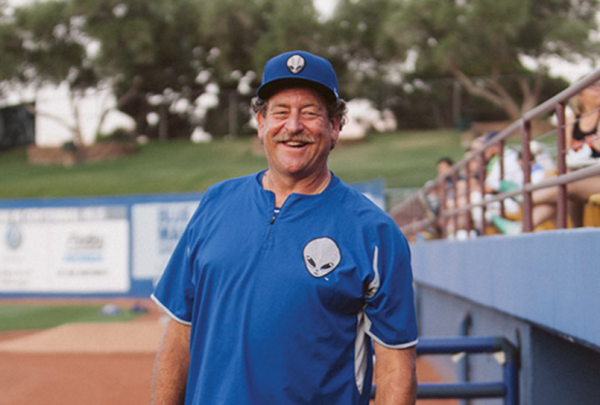
MMO: Who were the two or three arms that impressed you the most for the 51s this past season?
Frank: This year was a very difficult year, as you know. I mean, thirty games under .500 is frustrating for anybody, you don’t want to lose at any level. But, to answer your question, after the ‘15 season when we went for it and got to the World Series, we lost a lot of pitching depth. Most of those guys would’ve been at the Double-A or Triple-A level this year that would’ve made a big, big difference. I think at one time we didn’t have a guy on the 40-man roster on our 13-man pitching staff, at one time during the season!
The most important thing for a coach is to make these kids, and this is a pitching coach, hitting coach, manager, coordinator, you want to make these kids as good as they can possibly be. [You want to help them] be able to get up to the big leagues to help the big league club for as long as they can, but [also] just to be able to live out a dream.
To answer your question of the two or three guys that really came through this year that really opened up some eyes in the organization, one was Tyler Pill.
I think that Tyler was never able to break that wall between Double-A and Triple-A. This year, he not only broke through that wall but he just shattered the wall! He pitched great with us at Triple-A when he got called up. He started at Double-A, got to Triple-A in a hurry, [and] did a great job with us. The Mets needed an arm up there and he did a great job for the short period of time that they asked for.
Ultimately he got hurt and had the surgery. But he was the guy if you were to ask at the beginning of the season, would he have made a difference at the big league level? A lot of people would’ve said well, I don’t know. He was the one guy starting wise that really opened up a lot of eyes after everything was said and done.
The three relievers that blossomed this year, [one] was Paul Sewald. We’ve always known how good he was but when you watch him on an everyday basis, that’s when the kid wins you over. From his work ethic, to how he approaches every game, to how meticulous he is on the mound; quick worker, strike thrower, does everything you could ask him. If I watched you pitch yesterday, Mathew, and then I don’t come back for three months to watch you again, you’re going to go, he doesn’t impress me there’s nothing there that impresses me. But when you watch him on an everyday basis you go, hey, this kid’s got something, let’s give him an opportunity to see what he can do. He went up there and he’s had a couple of bad games up there but he’s a rookie, that’s going to happen.
Chasen Bradford has gotten an opportunity after seven years with this organization. I think everybody was finally in tune with the fact that he’s a sinker-ball pitcher; he will get ground ball after ground ball. He’s not going to be that prototypical 96-mile-per-hour strikeout reliever that baseball looks at today. It took him a while to get his opportunity, but he’s been called up there and I’ve thought since he’s been up there that he’s done a very credible job.
I guess the one big sleeper for everybody in the organization, maybe not for everybody, but for a lot of them was Kevin McGowan. Kevin was a non-roster invitee in spring training. You looked at him and his numbers never really spoke anything to you. But then he got to Triple-A and he pitched, and once again, I always throw the word work ethic out there. When I see a kid working hard, trying to do his dry work on the mound and just trying to make himself better for better’s sake, those are the kids that will always give themselves the best chance possible to succeed.
Kevin worked his butt off this year, he got better as the season went on. August he got called up, and he came up and down a couple of times but he went up and did a nice, credible job. And that’s what we do, that’s what makes us happy as coaches, giving these kids an opportunity to pitch and put a big-league uniform on and live out a dream.
All four of those kids had an opportunity this year and they’ve made the most of it. I just hope they continue to get the opportunity going forward.
MMO: You’ve had the chance to coach most of the Mets’ young arms in deGrom, Syndergaard, and Matz. Can you give me a little info on each and what you saw from them early on?
Frank: It’s not really difficult when you see the talent that they possessed. Some people have just God-given talent, some people have to work their tails off to get to the best of their ability. The three guys you just mentioned, not only did God give them talent and ability but they gave them, and here I go again with that work ethic. That ‘it’ factor that you just can’t explain, it’s just there. I’ll start with Jacob.
I didn’t have Jacob in the Triple-A level because that’s when I was coming back from my heart surgery so Tom Signore covered for me there and he really did a terrific job with Jacob at the Triple-A level to get him to the big leagues.
I had Jacob back in Savannah when he first came back off of his Tommy John surgery, and I’ll never forget the conversation with him. He got up there and he just dominated right from the start. You knew he would, he just needed to be healthy.
He looked at me one day and he goes, “I’m 23-years-old, Frank, and going nowhere. What should I do? Should I walk away from the game? Should I keep on plugging away?”
He was just questioning himself and his age and everything else.
I looked at him and I said, ‘Do me a favor. When you get to the big leagues I ask one thing of you: Leave me a ticket for that first game.’
We had more faith in him than he did at that time as far as him being a big leaguer. And look what he’s done since! You’ve got to throw age out the window, he just needed to be healthy. He was a shortstop who transitioned to learning how to pitch. It just takes a little time but look what he’s done since then. He’s a magnificent pitcher and one of the best in the game. Enough said about Jacob.
Steven Matz has always ways been one of my favorites. He’s a Long Island boy like me. He’s left-handed like me, so we had an attachment right from the beginning.
The biggest thing for Steven, and it’s still to this day, is just the injury woes. If he can stay healthy, being left-handed with the stuff that he possesses, he’s a perennial All-Star in my opinion. That’s the kind of stuff he possesses.
His fastball is devastating, his changeup is outstanding. I’d like to see him stick with one breaking ball. I like to see him throw the breaking ball, the curveball over the cutter just for the fact that it’s very difficult to throw two tight breaking balls and be successful with both. I think that if he stuck with one pitch and stayed true to that pitch, I think that pitch would have more consistency than what I saw this year. But that’s not here nor there, the kid’s a winner.
The kid’s makeup is off the charts. I think the big thing now is he has to feel and know that he’s healthy and hopefully with this last surgery, moving that ligament to the other side, he’ll have no problems going forward and he’s finally going to be the pitcher that everyone expects him to be. If he stays healthy he’s an All-Star every year.
Noah was probably the most intriguing of all the pitchers you just mentioned because he actually struggled in the minor leagues. And it was funny watching him struggle and seeing his daily emotions as to how to try to work his way out of the struggles.
Everything came pretty easy to him, everything came pretty easy to all the guys I just mentioned, but you know it’s how they get through the tough times that really let you see what type of makeup they have and what kind of future they’re going to have.
Noah’s my favorite one because after I came back from heart surgery in June ’14, Noah was really struggling. He struggled pretty much for the remainder of that year even when I got there. It was just the fact that he was so gung-ho and so locked into saying, I have a 98 mph fastball, I’m going to blow it by you anytime and I will be successful with that pitch.
Once again, I throw the Pacific Coast League at you because the Pacific Coast League has some of the best 4A hitters. You take a young kid who throws 98, they’re not going to be scared of a kid that throws 98 mph fastballs, especially one that didn’t have a lot of movement on it. Granted, Noah’s got one of the best arms in the game, but, at 98 coming at you pretty straight, these guys make adjustments and hit them.
The biggest adjustment for Noah was saying, dude, you’ve got a changeup, you’ve got a curveball, you got this cutter that Dan Warthen taught you, you’ve got all these pitches that are plus pitches and you have to understand when you’re behind in the count you have to show those pitches, you have to change things up. Once he understood that and once he went on the mound and started throwing a 2-1 changeup or a first-pitch curveball, all of a sudden now these hitters have these different look on their faces going, oh my God, he’s starting to figure this out. Watch out! And then he’s taken off from there.
Trust me, this whole conversation, Mathew, I don’t want any of this credit. This is just stuff that we work on as coaches. I mean, you have that from every level up with the coaches he’s had. It’s the kids that take the advice and use it to help them become better.
There are so many coaches in my career that I took and listened to and as I walked away I just threw it out the other ear and said, the hell with that! That has nothing to do with me, who I am, what I am.
There’s other vital stuff that you might think is so minute that just, the way you say it or how you say it or when you say it just might stick with that kid and all of a sudden it clicks. Maybe not right then but a couple of years later. Those are the kids that get it, those are the kids that pick things through. Noah is probably the most thought-worthy person, I mean, he takes everything you say literally. It was finally at the point where I said, ‘Hey, understand what we’re saying but really take some things that apply to you. You don’t have to listen to everything said and try changing things because of that.’
Once he struggled and wasn’t called up at the end of the ’14 year, he came back the following year and the four weeks into Triple-A he just killed it. You knew at that point on he got it, he would never forget it, and he was going to go up there and have an unbelievable career. Granted, the injuries will always occur but I think he’s your bona fide number one, even Jacob. If you can keep those two together and have a healthy Matz going forward, you have three unbelievable pitchers going forward.
You’re going to have ups and downs, but, I still take those three anytime on my staff and I take my chances.
MMO: With the time you’ve spent in the minors as a pitching coach, is the goal to now make it as one in the majors?
Frank: When I started seven years ago and got back in the game, I wanted to make a difference. I thought at the time the minor leagues, working at the minor league level with the younger kids, would be able to be that fulfillment for me, and it did. I’ve gone along and I’ve seen the way the game is and where it’s at and how I can help even at the big league level.
Yeah, to answer your question, I’d love to be a big-league coach; [to] bring my expertise and be able to help an organization.
I think that I’ve learned enough at the lower levels, at the lowest of levels on the way up this ladder of Minor League Baseball which will help me apply anything at a given big league level and make a difference as far as words, thoughts and ideas and stuff like that.
The big thing is, you have to throw in the analytics and all of that stuff and it’s been very helpful being down here and seeing TrackMan, how it applies to pitchers, to all of these shifts baseball has been putting on. It’s been very helpful in getting the knowledge because I’m old school. This is all new stuff to me which is absolutely great to be part of because you can take some of that stuff and really use it to your advantage.
To take all of that and take all my years of being a pitcher and as I mentioned earlier, the mental part of the game and apply all that, yeah, I’d like to give it a shot and see how it plays out.
MMO: Frank, thank you so much for your time today. It was a pleasure to speak with you and I sincerely hope you get the opportunity to be a pitching coach in the majors one day.
Frank: I appreciate that, Mathew. Good talking with you.
Follow Frank Viola on Twitter, @FrankViola16


